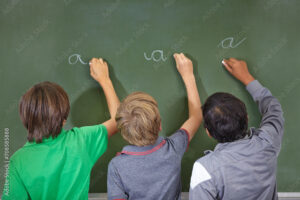Hello friends! Welcome back to my blog. In this post, I want to share why I strongly believe schools should continue teaching skills that technology could do for us like cursive writing, multiplication tables, and spelling. These basics are more than nostalgic. They build brain strength, confidence, and real independence. 
Why I believe in teaching these basics????
Cursive & Handwriting Connect the Mind and Heart and to support this I have brought for you some recent researches and highlights as below: 
- Research from Reading Rockets shows that handwriting instruction helps children link letter forms, sounds, and spelling which improves reading, writing, and literacy skills in early years.
- A recent Guardian article highlights that handwriting even cursive supports creativity, focus, memory, and connects us to cultural history.
- At BISB Boston, educators found that cursive boosts cognitive development and fine motor coordination.
A personal memory: I recall practicing cursive in school and feeling speed and rhythm in my writing. Now, unlike typing, my notes feel more personal and in tune with my thoughts.
Tables: The Superpower of Mental Math 
- A Demme Learning blog post explains how developing math skills like table learning and multiplication from a young age is crucial, as it supports logical thinking and problem-solving abilities, its boosts up confidence and helps in developing long-term memory, making it easier to grasp and master more advanced concepts later on.
I am a teacher and I’ve seen students stumble over fractions simply because they weren’t fluent in basic tables. That delay breaks their confidence so quick recall helps them stay engaged.
Spelling: More Than Spellcheck
- Spelling instruction remains key to literacy. Spellcheck tools don’t teach pattern recognition or vocabulary expansion.
- Deliberate spelling teaching fosters understanding of language structure and builds reading fluency.
As a matter of fact, practicing recall (e.g. saying tables aloud or writing spelling) boosts long-term memory more than just re-reading. It embeds knowledge in ways students can access later. Source: Wikipedia
- Many U.S. states are reintroducing cursive in schools like Iowa, now requiring cursive instruction because of evidence that it improves literacy and cognitive engagement.
- Infact, as per CBC Canadian Press, Ontario has supported a comeback to cursive in schools as cursive writing is a critical life skill helping young people to express more substantively, to think more critically, and ultimately, to express more authentically
Why Tech Doesn’t Replace These Skills
Think of basic skills like a foundation for a building:
- For cursive: Even the best AI can’t replicate the creativity, identity, and brain engagement of writing by hand.
- For multiplication: Calculators don’t build speed or confidence and students rely too heavily on tech.
- For spelling: Spellcheck can’t teach language awareness or subtlety.
Technology is a tool. But tools can fail. When devices are unavailable or malfunction, the real strength comes from what students can do independently.
While teaching, I’ve seen:
- Students were unable to sketch a quick chart because they were reliant on typing.
- A shy student lights up when handwriting their first note instead of typing.
- Ambition emerges in kids who have mastered multiplication orally as they tackle new math without fear.
The Balanced Approach
For me, the answer isn’t tech vs. basics, it’s a blended model:
Teach core skills like cursive, tables, and spelling. Then use technology to amplify but not replace them.
So I stand by that technology can be a tool for creativity and problem-solving built on a foundation of confident skills.



I really appreciated how you started with an open mind and allowed the debate, research, and your teaching experiences to shape your perspective. Your examples, especially during COVID and your story about the shy student using assistive tech, were powerful reminders of both the potential and the limits of technology. I also loved your point that technology is not neutral—it really depends on access, context, and how it’s used. Your post clearly shows that equity requires more than just tools—it needs intention, support, and systemic change. A great, well-rounded reflection!
Thank you for this passionate and well-articulated piece. Your argument resonates deeply with me, especially as you frame foundational skills like cursive, multiplication, and spelling not as antiquated but as empowering tools that build learners’ cognitive strength, independence, and confidence. The blend of personal reflection and research you provide gives your writing even more weight and credibility.
I particularly appreciated your analogy of the basics as a foundation. Without it, technology becomes a crutch rather than a support system. Your examples, such as the student struggling with fractions due to weak table recall or the boost in confidence through handwriting, paint a vivid picture of the enduring value these skills offer in actual classroom scenarios.
Your call for a balanced approach couldn’t be more timely. Technology should indeed enrich the human-centered learning that core skills facilitate, not replace it. Thank you for reminding us that behind every digital tool is a student who must be a strong and thoughtful learner and that begins with the basics.
Nofisat
Hi Kritika
It’s true that basic skills like cursive writing, multiplication tables, and spelling are essential for a child’s overall development. Schools are not just places for academic learning but spaces where children grow socially and intellectually through human interaction. Activities like handwriting, mental math, and spelling without digital tools help build memory, focus, and cognitive strength. These foundational skills boost confidence and creativity, which technology alone cannot fully nurture. I have seen students become more engaged and expressive when working with hands-on tasks rather than relying on screens. While technology is a valuable tool, overdependence can limit independent thinking and problem-solving. A balanced approach is necessary, one where students first develop strong basic skills and then use technology to enhance learning. This way, we prepare children not just to consume information but to think critically, act confidently, and learn meaningfully.
Sarada
Hi Kritika,
We didn’t see eye to eye on the cell phone issue, but we are certainly on the same page with this topic. lol.
I agree with you that “technology is a tool,” but tools can fail. When devices malfunction, the real strength comes from what students can do independently. I recall one of our classmates sharing the story of her aunt, who had retired, but was called back to work because the new staff is highly dependent on technology, which sometimes has errors that they cannot detect. Like you, I have seen students come alive when they finally grasp an elementary concept, such as oral communication. My son is currently enrolled in an abacus program, which he doesn’t like. He would often ask why he can’t learn the same thing on the internet. I constantly remind him of the importance of the physical program and how it aids in his time management, critical thinking, and hand-eye coordination.
As it relates to handwriting, I concur with you that cursive supports creativity, focus, memory, and connects us to cultural history. I, too, retain more when I write. I believe that the physical interaction between the writing tool and the page seems to cement ideas more firmly in my mind.
I support traditional learning methods, especially in the early years. In the later years, technology should be integrated in a balanced manner.